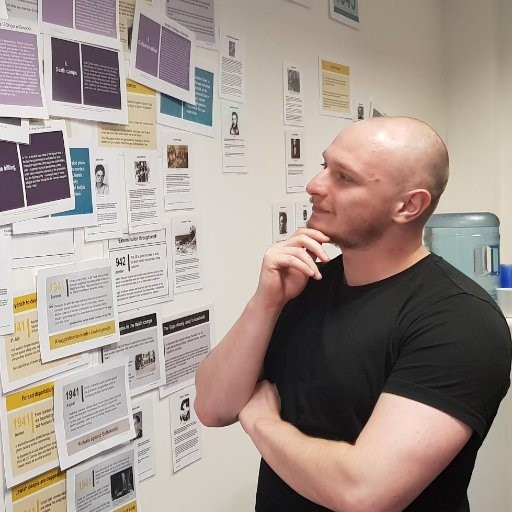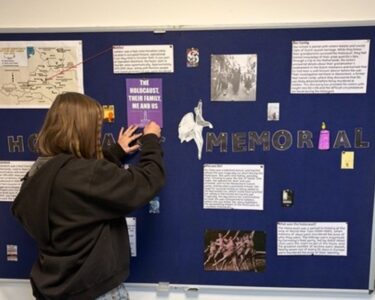Like any school, the start of the year brings with it new arrivals. New students, new staff, new colleagues.
This year Executive Director Prof Stuart Foster can announce:
‘We are delighted to welcome two new colleagues to the Centre team. Helen McCord and Corey Soper are enthusiastic and innovative educators with a strong background in Holocaust education. Above all, they have impressive experience as classroom teachers and are committed to the Centre’s goal of ensuring our work is underpinned by high-quality, research-informed practice. I am very confident they will be outstanding additions to our pedagogical team and we very much look forward to working with them.’
The start of the academic year and a new term is, always busy, with so much to plan and do. Schools, departments, Centre and work places are complex spaces; time is precious and the to do list full, but as Head of External Relations and School partnerships, I took time out to sit with Helen and Corey, and have a chat about how they came to join us. It’s always good to talk, to share something of ourselves, our backgrounds and build positive working relationships. So, with their permission, it’s better still to share something of that conversation with our teachers and friends, so that you can get to know them too.
As with so many conversations among teachers we began with what brought them to education, to teaching. Helen’s response was quite common ‘Teaching was never part of my plan’. She went on to explain that after graduating from York University with a History and Politics degree, and trying a number jobs in Marketing she felt unfulfilled. ‘I missed studying history particularly. I was inspired to become a teacher following a day that I spent in a school in Luton. I loved it all, the pace of the day, the curiosity of young people, and the opportunity to work with my subject again and so I enrolled upon a PGCE course and never looked back’.
For Corey too, there was some measure of chance involved ‘I was inspired to become a teacher after my experiences in my second year of undergraduate where I took part in a program in Leicester to mentor underachieving boys at local schools. I was amazed by the opportunity to impact young people’s future and the privilege of working with young people and their limitless curiosity, passion and enthusiasm.’ Helen and Corey would both train to teach: Corey trained doing the PGDIP. Ed at the University of Birmingham and after two years as a classroom teacher he started as Head of History at Jewellery Quarter Academy. Following her PGCE, Helen worked in the same school for 16 years, predominantly teaching history, but also Government and Politics A Level, Citizenship and PSHE. Over time she would hold Head of Department roles at each, including the History department. Upon leaving the classroom to join our team she reflects ‘In those 16 years I was fortunate to work with some truly inspiring young people and I absolutely believe that teaching is the best job in the world.’
So given that ‘teaching is the best job in the world’ and their obvious love of the classroom, regard for the profession and their commitment to empowering and supporting young people, why would such talented middle leaders and experienced classroom practitioners elect to leave their schools and join the Centre for Holocaust education? What was it about the Holocaust and our CPD work that captivated or attracted them?
I’m often fascinated to discover what a person’s first memories or encounter with the Holocaust is. It is often something I ask teachers, school senior leaders, politicians and policy makers: was it a Holocaust mention at home, something in school, a survivor encounter, TV programme or film, a book? So I began by asking both Helen and Corey that question – would this reveal why thy applied for our posts?
Like some, Corey had to think hard to reach for that first Holocaust awakening. ‘I can’t say I remember my first encounter with the Holocaust…’ After a few moments of reflection, he pointed to a literary stimuli ‘…perhaps the most affecting early experience was reading I Have Lived a Thousand Years by Elli Friedman / Livia Bitton-Jackson as a teenager. The vivid first person account affected me greatly, and Elli’s bleak and stoic description of like in Auschwitz and the slow insidious progress of antisemitism in occupied Czechoslovakia was the beginning of my interest in testimony and personal experience of the Holocaust.’

For Helen, her emerging passion for the study of history coincided with the increasing popularisation of the Holocaust with the release of Spielberg’s film Schindler’s List. Her experience at school was also significant: ‘My interest in finding out more about the Holocaust was really captured when I chose to research the question “How far was there resistance to the Holocaust?” for my History A Level. I am not sure that I managed to reach a definitive answer but my research enabled me to interview a member of Manchester’s Jewish community who was a survivor of the kindertransports. I was also shocked to discover though that overall the responses of the British government fell far short of what they could have done to help those being persecuted both in the 1930s and during the war.’
Given that so often Holocaust teaching and learning is driven by curriculum champions – individuals in schools with a personal passion, curiosity or interest in the subject – I wondered what role the Holocaust had played in their teaching careers and what challenges they had faced as practitioners. Helen outlined her collaboration with the RS department to deliver Holocaust content to Year 9 students to coincide with Holocaust Memorial Day. She spoke of the impact of welcoming a survivor speaker into school and the importance of trips such as to the Imperial War Museum. She explained ‘In different guises, for different specifications I have also always taught the Holocaust at A Level. For many years I have organised educational visits to Berlin and Munich to complement the studies of our A Level students. These visits included many sites associated with the Nazis and the Third Reich and also with the Holocaust. In Berlin for example, the Wannsee Conference villa, the Memorial to the Murdered Jews of Europe, the Jewish Museum and Sachsenhausen concentration camp.’
Corey’s response was less curriculum specific but was no less illustrative. ‘I’ve simply found the teaching of the Holocaust to be a persistent factor and challenge in my career. Similar to many other teachers, I’ve always felt an enormous pressure to ‘get it right’, which is why I felt so privileged to work with the Beacon School programme to improve my delivery of the Holocaust.’ His concern to do the subject justice or ‘get it right’ reflects a duty many teachers feel, so led naturally to my next question, what about the challenging times faced and the ah-ha moments of breakthrough or success that frame their Holocaust teaching and learning?
Helen’s mind went immediately to her former school – an Upper School, where students started in Year 9, ‘…the biggest challenge in teaching about the Holocaust was always unravelling their existing misconceptions. Many students arrived with the misunderstanding that Hitler hated Jews; that Germans who refused to shoot Jews would be punished or even shot themselves and that Hitler was solely to blame for the Holocaust. We endeavoured to address these misconceptions through our courses in both History and RS ensuring that we covered the roots and development of antisemitism and the role of bystanders, collaborators and perpetrators. I would hope that we succeeded with most of our students but in Year 9 students were taught in large mixed ability groups, some students still seemed to struggle to move away from the misconceptions with which they arrived to the lessons. Perhaps the more complex reality was just too difficult or even too uncomfortable for some to grasp?’
On the flip side, having the chance to hear direct testimony from a survivor in school was an incredibly powerful learning opportunity. Helen described it as a ‘privilege’, a time bound honour and enriching life experience, whilst ‘The impact of taking pupils to meet with survivors and hearing them respond to that experience – the profound sense that the Holocaust had become something real and tangible, rather than a distant historical event’ were among Corey’s most treasured memories of his time working in school. Both spoke of their pride in their former students, ‘I was always really impressed with how well all of our students responded to listening to their testimonies.’ Helen commented ‘Over the years I have been fortunate to hear Josef Perl, Stephen Frank and Zigi Shipper. As young boys when they and their families were swept up in the Holocaust their testimonies really had an impact upon all of our Year 9 students. Even those students with potentially disruptive behaviour patterns sat for an hour and a half mesmerised by the accounts that they were hearing. This was definitely the most rewarding part for me.’
So why then would they apply join the UCL Centre for Holocaust Education, and, what do they hope to bring to the team? Both clearly believe all learners have a right to Holocaust education, as such it was interesting to learn of Corey’s background working with vulnerable students. ‘I have experience working with pupils with severe Special Educational Needs through my time as a Teaching Assistant and with working with pupils from very deprived backgrounds (the catchment area for Jewellery Quarter Academy is among the most deprived in Europe) – I think it is critical that we ensure the Centre’s resources and teaching can be accessed by those pupils too.’
Having attended our ‘Unpacking the Holocaust’ CPD day and ITE course as a subject leader for Beds SCITT Helen was ‘…very impressed by the quality of the resources and the CPD that the Centre provide. When the opportunity came up to work with the Centre, and help deliver and develop these courses, it seemed a very exciting prospect, and one that came at a time in my career when I was ready for the next challenge. Having worked with PGCE trainees for many years I am keen to assist the centre in working with as many ITE providers as possible to ensure that our colleagues benefit from the Centre’s work right from the start of their careers in teaching.’ Such passion and regard for research informed quality provision for, and experience of specialist CPD to support teachers and commitment to Holocaust education as a right for all learners, irrespective of stage or need – ensures Helen and Corey can contribute distinctively to the teaching team and it’s a wonderful opportunity for them to share their best practice and recent classroom experience with colleagues whilst helping us review programmes and develop new materials.

Talking to both, it was clear they valued and championed a teacher’s right to specialist and ongoing professional support, but more than that, they viewed it with a moral and safeguarding lens, and an urgency to the imperative to do so. As Corey said ‘…Holocaust survivors are passing away. This current generation may well be the last to benefit from direct testimony from these remarkable people, so it is critical that we record that testimony and create accessible resources for young people to access. Secondly, we live in a time of increased anti-Semitism, populism and far right activism. I feel learning about the Holocaust can serve as an inoculation against those views and that is only possible by investing in and supporting teachers.’ In a fractured and divisive social, economic and political climate, with intolerance and hate crime on the increase, Helen remarked ‘…there has never been a more important time for educators to deliver effective Holocaust education. I am very much looking forward to working as part of a team who provide excellent training, support and resources for teachers and trainees to help them to do this.’ And, of course, our team are excited by the challenges and opportunities ahead and the contribution both Helen and Corey can make to our outreach work.
But our chat wasn’t all Holocaust teaching and learning related. Like all good colleagues, Helen and Corey have lives beyond the school, Centre or office – so was fun to discover that Corey had ‘…fought a no-holds-barred amateur Mixed Martial Arts cage fight for charity last year, raising £700 for Cancer Research for the cost of just a few bruises and knocks to my pride’. Whilst Helen revealed ‘…I have always cheated on history with fashion, I love clothes. So imagine my delight when in my 3rd year at University I won the award for ‘best dressed’ but also ‘worst hair’!’
So, as I drew our chat to close, it was clear the Centre has two experienced and dedicated classroom practitioners, Holocaust education advocates, champions of investing in teachers through quality CPD joining our team. We are excited to learn more and, like our CPD participants, get to know them better in the months ahead and we are delighted that they will help move our Centre and work forward. As Director of Programmes, Ruth-Anne Lenga said: ‘This is an exciting stage in the Centre’s work as it expands its workforce and its expertise. Corey and Helen bring top class teaching skill, and front line know- how to our already world leading centre of excellence. We cannot wait to introduce them to our fast-expanding alumni teachers across the country who, through our work and their own skill and tenacity, have become dedicated teachers of the Holocaust.’
All that was left to be said at the end of our chat was ‘Good Luck Corey and Helen – welcome to the team!’
By – Nicola Wetherall MBE



